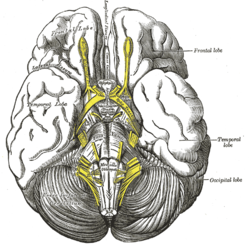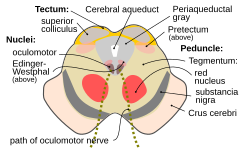The interpeduncular fossa is a deep depression of the ventral surface of the midbrain between the two cerebal crura.[1][2][3] It has been found in humans and macaques, but not in rats or mice, showing that this is a relatively new evolutionary region.[4]
| Interpeduncular fossa | |
|---|---|
 Base of brain | |
 Section through superior colliculus showing path of oculomotor nerve (interpeduncular fossa not labeled, but visible at bottom center) | |
| Details | |
| Identifiers | |
| Latin | fossa interpeduncularis |
| NeuroNames | 489 |
| Anatomical terms of neuroanatomy | |
Structure
editThe interpeduncular fossa is a somewhat rhomboid-shaped area of the base of the brain.[5]
Features
editThe lateral wall of the interpeduncular fossa bears a groove - the oculomotor sulcus - from which[6] rootlets of the oculomotor nerve emerge from the substance of the brainstem and aggregate into a single fascicle.[3][6]
Anatomical relations
editThe ventral tegmental area lies at the depth of the interpeduncular fossa.[3]
Boundaries
editThe interpeduncular fossa is in front by the optic chiasma, behind by the antero-superior surface of the pons, antero-laterally by the converging optic tracts, and postero-laterally by the diverging cerebral peduncles.[5]
The floor of interpeduncular fossa, from behind forward,[citation needed] are the posterior perforated substance,[2] corpora mamillaria, tuber cinereum, infundibulum, and pituitary gland.[citation needed]
Contents
editContents of interpeduncular fossa include oculomotor nerve, and circle of Willis.[citation needed]
The basal veins pass alongside the interpeduncular fossa before joining the great cerebral vein.[7]
Clinical significance
editThe most common locations for neurocutaneous melanosis have occurred along the interpeduncular fossa, ventral brainstem, upper cervical cord, and ventral lumbosacral cord.[8]
See also
editAdditional images
edit-
Human brainstem anterior view
-
Interpeduncular fossa. Cerebrum. Deep dissection. Inferior dissection.
References
editThis article incorporates text in the public domain from page 816 of the 20th edition of Gray's Anatomy (1918)
- ^ Basinger, Hayden; Hogg, Jeffery P. (2022), "Neuroanatomy, Brainstem", StatPearls, Treasure Island (FL): StatPearls Publishing, PMID 31335017, retrieved 2022-08-08
- ^ a b "fossa interpeduncularis". TheFreeDictionary.com. Retrieved 2022-08-08.
- ^ a b c Gray's anatomy : the anatomical basis of clinical practice. Susan Standring (42nd ed.). [New York]. 2021. pp. 456–459. ISBN 978-0-7020-7707-4. OCLC 1201341621.
{{cite book}}: CS1 maint: location missing publisher (link) CS1 maint: others (link) - ^ "BrainInfo". braininfo.rprc.washington.edu. Retrieved 2019-04-03.
- ^ a b "Interpeduncular fossa". IMAIOS. Retrieved 2019-04-03.
- ^ a b "sulcus of the oculomotor nerve". TheFreeDictionary.com. Retrieved 2022-08-08.
- ^ Gray's anatomy : the anatomical basis of clinical practice. Susan Standring (42nd ed.). [New York]. 2021. p. 422. ISBN 978-0-7020-7707-4. OCLC 1201341621.
{{cite book}}: CS1 maint: location missing publisher (link) CS1 maint: others (link) - ^ Islam, Monica P. (2015). "Neurocutaneous melanosis". Neurocutaneous Syndromes. Handbook of Clinical Neurology. Vol. 132. pp. 111–7. doi:10.1016/B978-0-444-62702-5.00007-X. ISBN 978-0-444-62702-5. PMID 26564074.